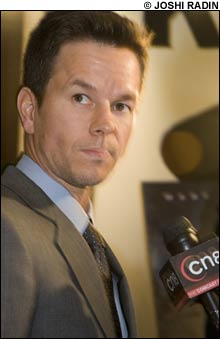
BAD BOY: Wahlberg's own frequent run-ins with the law later inspired his foundation, which helps local at-risk children. |
“How’s it goin’?”Before I even get my tape recorder turned on, Mark Wahlberg stands to greet me. He offers a cordial handshake and a warm, boyish grin that defies the fact that he’s in Boston’s Four Seasons hotel on business, granting a rapid succession of interviews to promote this week’s starring vehicle Shooter. All of which, of course, comes on the heels of his recent Academy Award nomination for his turn as the profane Officer Dignam in Martin Scorsese’s The Departed. The Boston-based epic of duplicity on both sides of the law won four of the five Oscars it was up for, including a long-overdue directing statuette for Scorsese. Yet Wahlberg, despite universal critical acclaim, didn’t win.
Among the impressive number of accolades he did collect in the buildup to his nomination was an award from the Boston Society of Film Critics, of which I’m a member. So I’m surprised when he says he didn’t receive his award certificate. Still, Wahlberg is gracious enough to insist the honor was important to him.
“I remember when my agent called me and told me. Because especially, playing a character from back home, in that world, that was as nice as getting nominated. It really was,” he says. “I was hoping there was some sort of a certificate or something –– to put on my wall. I won for the National Board of Review, and they gave out plaques . . .” But, he says, “it was a very nice honor.”
It’s been a long but steady rise to the A-list for the former underwear model and onetime rapper Marky Mark. Born and raised in Dorchester, the youngest of nine children, the 35-year-old Wahlberg attended elementary school at Roxbury’s William Monroe Trotter School, which comes as a pleasant surprise, since I attended the Trotter at the same time. I fondly recall the school as a melting pot of cultures, a mecca of tolerant ideals, and multicultural friendships following the then-recent wounds of Boston’s busing crisis (itself brutally encapsulated in the opening moments of The Departed). Wahlberg remembers the gym.
“They had the low-rim basketball court,” he reminisces, before mentioning “all the fights that I got in at the Trotter.” Since I always retreated at the first sign of violence, it’s no wonder I didn’t know him back then.
Later, Wahlberg attended the Phyllis Wheatley Middle School, though the last grade he graduated from was the eighth. “I tried the ninth a couple of times, but it just wasn’t . . . ” His voice trails off for a moment. “I just didn’t pay any attention there. I was too busy running around downtown.”
“Running around” puts it mildly. In fact, run-ins were more likely in those days. During the Oscar ceremony last month, a lot of comic mileage was gained from allusions to his troubled youth, with host Ellen DeGeneres joking that he had been arrested 25 times. But is there any truth to that?
“Look, people ask me, ‘How many times have you been arrested?’ A bunch. How many times was I arrested with my own name? That’s just one story. But, I mean, we lived in the hustle every day, so obviously there was a lot going on.”
That “hustle” landed him in Deer Island penitentiary for a 50-day stint when he was 16 years old. It was during this period that one of the lasting figures in his ongoing spiritual rehabilitation would emerge. “When I was in jail and none of my friends came to visit me, Father Flavin was there the first day. Every time, whether it’s been bad or good in my life, he’s been there,” he says of the St. William’s Parish priest whom he’s known since the age of 13 but now considers a member of the family.
“I just wish that I had recognized that he was the person that I was supposed to be looking up to early on. Or that Mike Joyce of the Boys Club was the role model that we didn’t think existed, because we were too busy looking at the guy who’s got the nice car and the hot girlfriend –– and he didn’t do the right thing to get either one, probably.”
Wahlberg has since changed his ways, and, even with his burgeoning success as an actor, hasn’t forgotten his roots. “I came from a pretty tough neighborhood,” he says, “and I certainly wasn’t put in this position to forget where I came from.” Naturally, this is where the Mark Wahlberg Youth Foundation, which raises money and creates opportunities for at-risk children, comes in. Though the organization is run by his older brother Jim, Wahlberg does his part to lead by example. “I try and influence them to explore the arts,” he says. “I think they can identify with me, and I think the more I communicate with them directly, I think I can have a positive impact.”